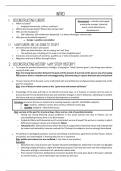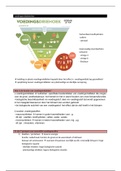Deconstruct = critically interrogate
• What is Europe? a particular concept, historical
Imagined community, culture, continent … event, social phenomena,
• Where does Europe begin? Where does Europe end? development …
• Who are the Europeans?
Self-reflection, self-entitlement (depends), it is where ideologies come to play
• Who gets to be called Europeans?
→ Europe = positive connotation
• Deconstruction of places and spaces
When we draw borders, we are saying 'we' and 'they'
The political way of looking at the map is not that straightforward
• Inclusions and seclusions of countries, qualifies as a "who is European, and who isn't"
• Migration and how it differs through history
• To escape the present (distraction), nostalgia, a longing for "what's forever gone"; past things were better;
saying of older ones
Risk: too strong demarcation between the past and the present; if you look at the past as way of escaping
the present, there's a tendency of overexaggerating, disconnecting or rupture between past and present
• To learn lessons from the past: we're confronted with moral dilemma, key figures/many people look at the
past for inspiration
Risk: a lot of biases in what counts as the "great men and woman of history"
• Knowledge of the past will help us to identify structural laws, as if humans in society can't be exact or
precise but we'll try to identify those laws and evolution changes in men's behaviour, allowing us to predict
the future and see an endpoint to historical development as mankind
Teleology presumes that we as mankind are evolving towards a specific, identifiable endpoint:
1. : classless, stateless society, best society is without income gap
2. : endpoint = liberal democracy
Risk: we look at the past for structural laws, there can be a risk of overdetermination
Having too strong believing causal prediction in the social sciences but also in history; we are
oversimplifying history, there is no third answer
Endpoints (Marx and Fukuyama) aren’t uncontested: we are all equal? Do we live in a society in which
differences between classes are irrelevant? (Marx)
Fukuyama (90'): liberal democracy where the west is supported by individual values and underpinned
by reason and rationality; have we reached this? Perhaps his endpoints are too strongly formulated
• For political or ideological purposes: to prove something, to build story, agreements to their favour, history
and politics are intermingled → learning who we are is important
Risk: politics and science are too conflated (= too close to one another)
Examples
Education was a way to prove one's proper education (intelligence), today that is less the case (google)
Selecting reading of history, a light with National projects: first historians were not fully independent,
they were writing in commission of a particular nation-state
Post-colonial movement, deliberation movement (outside the west): goes back to the past in attempt
to rewrite history, a lot of information was written by the west
, • To understand change and continuity (e.g., mass migration)
• To understand institutionalisation (democracy: how it took place) and revolution
"For every institution or value that disappears or is changed, another stays the same"
• Studying history is to understand why us in the present do what we do
• Turbulent times: today times are difficult (google it = a lot of pages) but also in the 19th century (mass
migration, world wars …)
• Fake news is not something new, not only seen today but also in the past
E.g., normal to live in a democratic centre…
• Acknowledge the power struggles that are the basis of today's institutions, ways of life … if historical
events would have been different, today's outcomes would be different too
• To question uniformity of European experience, critical awareness of arbitrariness of present way of living
• Studying history also challenges the uniformity of the past; when we look at the past there is one story
told to us
E.g., industrialisation which didn't happen in a uniform way, it was different in different countries,
you can't only industrialise in on particular way
• To "provincialize" Europe, to account for multiple paths/meanings of "modernity"
There are different paths in processes from the past to our current practices
Important to recognize that the singular uniform European experience, is that it doesn't exist
It's important to account for the diversity of experiences before we start giving advice to other
countries
Historicism and the limitation of linear and singular conceptions of history
• with his critique on "historicism": historicism is the idea that "to understand anything, it has to
be seen both as a unity (uniform experience) and in its historical development"
Imaginary "waiting room of history" where one man's present becomes another man's future
It's when we understand history and development as a linear trajectory, we are in a way creating
this imaginary waiting room
• proclaimed that the democratic rule was powered by the people as the highest attainable
standard for government, that the best form of government is democratic self-rule
But at the same time, he argued against self-rule at Africans and Indians, this because they weren't
civilised enough
"Power to the people, but not these people" = PARADOX
• Coloniser to another human: "wait hang on we will speak about universalism and general human rights,
but for you I'll make you wait" they are winning the waiting room until sufficiently civilised (= western
experience of civilisation)
–
• A tendency to mask the heterogeneity of "European" experiences; it could be the bad industrialisation,
democratisation … we want to understand those processes
• A tendency to attribute a singular meaning to modernity and a singular trajectory to modernity
, • 1789 the collapse of French absolutist monarch until the eruption of the First World War in 1914
From a society of orders ("estates") to a society of classes
Popular sovereignty and new modes of political legitimation
• Economic and social transformation
• Demographic explosion and mass migration
• Dramatic changes in the political landscape
Birth of new European powers: unification of Italy and Germany
The consolidation of nation-states and imperialism
The incorporation of the masses in politics
• The normative pulse of Europe's narrative of "modernity":
Not simply by discussing a period, chronological
Europeans = fan of 19th century, things we like became modern
19th century is often conceived as the era that put the "Enlightenment Ideals" into practice
Enlightenment Ideals are intellectual ideas about reason and science that trickled down in society and
made Europeans modern
• "I think, therefore I am" by René Descartes = the creation of the
Enlightenment is "no official answer,
"modern man"; a person who is not tied to dogmas/beliefs;
thinks for himself because the era named by Kant's
Individualism and human reasoning essay was never demarcated by
• It is not like intellectuals met up and started to write handbooks opening and closing ceremonies like
about their ideas, if they ended up in the same room would end the Olympics, nor are its tenets
up in a dispute stipulated in an oath or creed" by
• Enlightenment is a part of European DNA, when political actors Steven Pinker
nowadays say that the ideas of enlightenment are under
pressure as the result of migration conflicts
"On either side of the Atlantic, groups of public intellectuals have issued a call to arms. The besieged citadel in
need of defending they say, is the one that safeguards science, facts, and evidence-based policy. The white
knights of progress condemn the apparent resurgence of passion, emotion, and superstition in politics. The
bedrock of modernity they tell us, is the human capacity to curb disruptive forces with coolheaded reason.
What we need is a reboot of the Enlightenment, now."
• "White knights of Enlightenment" (people like Pinker), present a selective reading of the Enlightenment
• Enlightenment thinkers, especially French intellectuals, placed a high value on the role of sensibility, feeling
and desire
• 19th century romanticism, nationalism, and fascism
• (1770-1831): emphasis on rationality produces citizens who are alienated, dispassionate and
estranged from nature
• (1711-1776): morality is grounded sense-experience; we judge the good/beautiful directly
and without need of reason
, • Because we link it with the 19th century
• Modern means being of today; so how can something of the 19th century still be called modern?
Modernisation paradigm (sociology, 1960s)
• Modernity is linked to a social-science modernisation paradigm
Modernisation = the
This paradigm isn't always linked to historical research in the
transformation from a
1950s-1960s
traditional, rural, agrarian
• We can see that the social science paradigm of modernisation became
society to a secular, urban
heavily intermingled with historical research, and this affected how
and
historical evidence has been interpreted
industrial society
• Rationalisation, industrialisation, and urbanisation • Reason-giving rather than tradition and habit
(from feudalism to capitalism) • Individualism, freedom and formal equality,
• Birth if nation-states and institutions of meritocracy
democratisation (representative democracy, • Faith in social, scientific, and technological
modern bureaucracy, public education ...) progress and human perfectibility and rationality
–
• When people draft the different labels (Middle Ages, renaissance …) it was also in this linear storytelling
leading up to modernity at some kind of endpoint of human history
"We are weighted down, every moment, by the conception or sensation of time" - C. Baudelaire
• It is in the 19th century that things began to change, and people became aware of the uniqueness of their
time
• All of a sudden, these people feel modern, they feel as if they've reached a new face in human development;
they became aware of the differences they had with the previous generations
• Modernity, in general …
… is the self-definition of a generation, about its own technological innovations, governance, and
socioeconomics
… is a particular relationship to time, characterised by intense historical discontinuity or rupture,
openness to the novelty of the future, and a heightened sensitivity to what is unique about the
present
• (1979) Future's Past: on the Semantics of Historical Time
"Der Moderne", "Les Temps Modernes", "Neuzeit", "Nieuwe Tijd": a temporal distinction, yet one
claiming a distinctive breach with the past
A historical consciousness and its transformation into a general model of social experience; an ability
to conceive a future as distinct from the present and past
18th century Enlightenment was a qualitative claim about the newness of the times, valorising
substantive changes
• Positive attribution to word "modernity" = progress and developed





